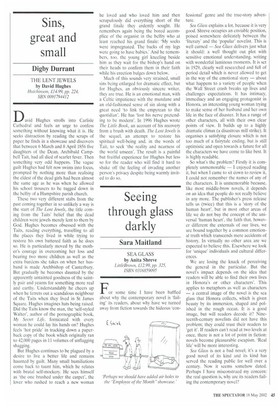Sins, great and small
Digby Durrant
THE LENT JEWELS by David Hughes Hutchinson, £14.99, pp. 224, SBN 0091794412 David Hughes strolls into Carlisle Cathedral and feels an urge to confess something without knowing what it is. He seeks distraction by reading the scraps of paper he finds in a showcase and discovers that between 6 March and 8 April 1856 five daughters of the Dean, Archibald Campbell Tait, had all died of scarlet fever. Then something very odd happens. The vague guilt Hughes had felt now swims into focus, prompted by nothing more than realising the eldest of the dead girls had been almost the same age as he was when he allowed his school trousers to be tugged down in the belfry of a Hampshire parish church.
These two very different stabs from the past coming together in so unlikely a way is the start of The Lent Jewels, the title coming from the Taits' belief that the dead children were jewels merely lent to them by God. Hughes becomes obsessed with the Taits, reading everything, travelling to all the places they lived in while trying to restore his own battered faith as he does so. He is particularly moved by the mother's courage in overcoming her loss and bearing two more children as well as the extra burdens she takes on when her husband is made Archbishop of Canterbury. But gradually he becomes daunted by the apparently untainted goodness of the saintly pair and yearns for something more real and earthy. Understandably he cheers up when he ferrets out a scandalous neighbour of the Taits when they lived in St James Square. Hughes imagines hats being raised. Did the Taits know the man, the 'self-styled Walter', author of the pornographic book. My Secret Life, fornicated with every woman he could lay his hands on? Hughes feels 'hot pride' in tracking down a paperback copy of the book which originally ran to 42.000 pages in 11 volumes of unflagging shagging.
But Hughes continues to be plagued by a desire to live a better life and remains haunted by guilt. Many small humiliations come back to taunt him, which he relates with brutal self-mockery. He sees himself as 'the one brushed under the carpet', the lover who rushed to reach a new woman he loved and who loved him and then scrupulously did everything short of the grand finale they ardently sought. He remembers again being the bored accomplice of the organist in the belfry who at least reached his grand finale: 'My socks were impregnated. The backs of my legs were going to have babies,' And he remembers, too, the young girl kneeling beside him as they wait for the bishop's hand on their heads to confirm them in their faith while his erection bulges down below. .
Much of this sounds very strained, small sins being enlarged for dramatic effect, but for Hughes, an obviously sincere writer, they are true. He is an emotional man, with a Celtic impatience with the mundane and an old-fashioned sense of sin along with a great need `to link the empyrean to the quotidian'. He has 'lost his nerve pretending to be modern'. In 1996 Hughes wrote The Little Book, an account of his recovery from a brush with death. The Lent Jewels is the sequel, an attempt to restore his spiritual well-being and, in the words of Tait, to seek 'the reality and nearness of the world unseen'. The result is a painful but fruitful experience for Hughes but less so for the reader who will find it hard to shake off the feeling of invading another person's privacy despite being warmly invited to do so,














































































 Previous page
Previous page